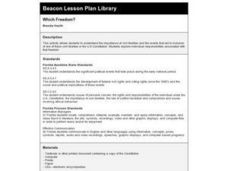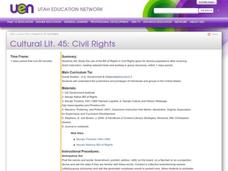Center for History Education
Women's Rights in the American Century
Today, many young people find it hard to understand why it took over 150 years for women in the United States to get the right to vote—why there was even a need for the suffrage movement. As they read a series of primary source...
K20 LEARN
Deconstructing Reconstruction: The Reconstruction Era
High schoolers examine the Reconstruction programs instituted following the American Civil War, the potential for change these efforts offered, and the realities that occurred. Guided by a PowerPoint presentation, class members read a...
Teaching Tolerance
Understanding Other Religious Beliefs
Learn what it means to respect others in an engaging instructional activity on religious beliefs. An inclusive resource focuses on understanding other religious beliefs, the right to freedom of religion, and the U.S. history of religious...
Curated OER
Which Freedom?
Fourth graders choose on the freedoms in the Bill of Rights and research it on the internet. They answer specific questions using their research and produce a written document using a computer.
Curated OER
Black Kentuckians and the Civil War
Students demonstrate how the American Civil War affected black Kentuckians socially and politically. They identify and discuss the 13th Amendment to the U.S. Constitution, which forced the end of slavery in Kentucky months after the...
Curated OER
Justice Demands an End to Segregation, But it Does Not End
Students define human rights and describe how it applies to politics, economics and cultural rights. As a class, they watch a video how the Constitution was made and discuss its purpose. In groups, they present information to the class...
Curated OER
Learning to Respect Each Other
Discover how important Martin Luther King Jr. is to our society. In this civil rights lesson plan, investigate how Dr. King was an advocate for nonviolence and how he fought for civil rights for all Americans. Read and analyze Dr. King's...
Los Angeles Unified School District
Why Is the Declaration of Independence Important?
Fair or unfair? To begin a study of the American Revolution, class members review the treatment of the people of the American Colonies by the King of England and decide which were fair and which were unfair. Class members then annotate a...
Curated OER
Search and Seizure in Utah
Students identify legal requirements of searches conducted with and without a warrant. They identify the legal standard for conducting searches in public schools. Students discuss the permit of search and seizure and have a search...
Curated OER
A Time for Justice
Young scholars explain the protections and privileges of individuals and groups in the United States.
Curated OER
Judges In The Classroom
Students explore legal requirements of searches conducted with and without a warrant and explore legal standard for conducting random searches of passenger vehicles preparing to board state ferries from a Judge who visits the classroom.
Curated OER
Wartime and the Bill of Rights: The Korematsu Case
Twelfth graders work together in groups to examine the discrimation Japanese Americans felt after the bombing of Pearl Harbor. Using primary source documents, they analyze and discuss the case of Fred Korematsu who was placed in an...
Curated OER
Creating A Bill Of Rights In Space
Students create an Intergalactic Bill of Rights and apply the United States Bill of Rights to a hypothetical situation.
Curated OER
The U.S. & Navajo Bills of Rights
Students are introduced to the United States and Navajo Bill of Rights. In groups, they compare and contrast the two documents and take notes to share with the class. To end the lesson, they write in their journals about their own...
Curated OER
Civil Rights
Students are introduced to the concept of Civil Rights. In groups, they use a timeline of the Navajo tribe to identify the ways the tribe has made advances in Civil Rights throughout the years. To end the lesson, they take notes and...
Curated OER
The Bill of Rights Today
Students examine the Bill of Rights, They read the Bill of Rights and clarify the meaning of the material using different reading strategies. In groups, students brainstorm to compare and evaluate their conclusions with those of others.
Curated OER
The "Right" Ideas
Students explain five rights guaranteed to them by the Bill of Rights. They describe their own views on the right to limit some of our guaranteed rights. They finally describe the role of a nonprofit organization and how they promote our...
Curated OER
Judicial Review
Students visit the Missouri Bar Civics Library to examine the process of judicial review. After completing a worksheet, they discuss the questions to determine what they learned, what more they would like to know, and how the...
Curated OER
Bill of Rights: Shapers of Meaning
Students review the Bill of Rights as a class. In groups, they use the internet to research the contributions made by historical figures in forming these rights. They create a poster showing the information they collected and present...
Curated OER
VA Statute for Religious Freedom, II. Matching Activity
Students read and analyze primary source documents. In this matching instructional activity, students read sections of the Virginia Statute for Religious Freedom. Students match the document sections with paraphrased sections and discuss...
Curated OER
After the Civil War: Segregation
Students study the Civil War. In this American history instructional activity, students define segregation, make a segregation collage with pictures of people being separated from others because of their race, religion, or ethnic...
Curated OER
Researching American Democracy
Students compare Watergate and the Clinton/Lewinsky scandal. In this U.S. Constitution lesson, students define vocabulary terms and read articles regarding the impeachment process. Students respond to questions that require them to...
Curated OER
Due Process of Law and the Jim Crow Era
Students analyze eight case studies of Supreme Court decisions regarding due process of law and their impact on American society in the early 20th century. They digest that although the 14th amendment was intended to give federal rights...
Curated OER
The Jury System
Students analyze Article III and the Seventh Amendment. In this US Justice lesson, students research the US jury system and complete a Student Jury questionnaire. Students will discuss the impact the implementation of the Jury System had...

























